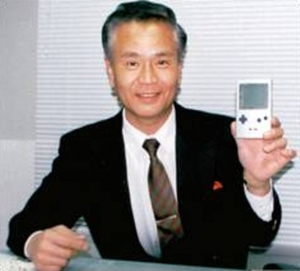Gunpei Yokoi: Difference between revisions
(add category) |
(add categories) |
||
| (2 intermediate revisions by the same user not shown) | |||
| Line 3: | Line 3: | ||
image = [[File:Gunpei_Yokoi.png|300px]]| | image = [[File:Gunpei_Yokoi.png|300px]]| | ||
known_for = Manager of [[Nintendo Research & Development 1|Nintendo R&D1]]<br />1970-1996| | known_for = Manager of [[Nintendo Research & Development 1|Nintendo R&D1]]<br />1970-1996| | ||
birth = September 10, 1941| | birth = September 10, 1941| | ||
death = October 4, 1997| | death = October 4, 1997| | ||
}} | }} | ||
'''Gunpei Yokoi''' (横井 軍平, September 10, 1941 – October 4, 1997) was a Japanese video game designer. | '''Gunpei Yokoi''' (横井 軍平, Yokoi Gunpei, September 10, 1941 – October 4, 1997) was a Japanese video game designer. | ||
==Nintendo Games== | ==Nintendo Games== | ||
| Line 24: | Line 23: | ||
{{DEFAULTSORT: Yokoi, Gunpei}} | {{DEFAULTSORT: Yokoi, Gunpei}} | ||
[[Category: People]] | [[Category: People]] | ||
[[Category: People born in 1941]] | |||
[[Category: People born in Japan]] | |||
[[Category: People who died in 1997]] | |||
[[Category: People who died in Japan]] | |||
[[Category: Ultra Hand]] | [[Category: Ultra Hand]] | ||
Latest revision as of 11:45, 17 September 2024

| |
| Gunpei Yokoi | |
| Known for | Manager of Nintendo R&D1 1970-1996 |
|---|---|
| Birth | September 10, 1941 |
| Death | October 4, 1997 |
Gunpei Yokoi (横井 軍平, Yokoi Gunpei, September 10, 1941 – October 4, 1997) was a Japanese video game designer.
Nintendo Games
After a series of bad business ventures, Nintendo entered the toy business in 1964. Gunpei Yokoi joined Nintendo in 1965 as a maintenance employee. However, as he was interested in creating toys during his spare time, he was moved to the Nintendo Games division.
In 1966, Gunpei Yokoi designed Ultra Hand, a toy that had an extending arm that could be operated like scissors to pick up objects. Ultra Hand became the highest-selling toy in Japan, resulting in Nintendo expanding in 1968 when a manufacturing plant was opened in Uji, a city on the outskirts of Kyoto. Yokoi developed another hit toy when he designed the "Love Tester", a toy that would determine how much two people loved each other. This toy was an even bigger hit than the last, and Nintendo began selling the Love Tester outside of Japan as well. As a result, in 1970, the listing of Nintendo stock was changed to the first section of the Osaka Securities Exchange.
Nintendo Research & Development 1
In 1970, Nintendo entered an agreement with Sharp to use Sharp light sensor technology in toys. To produce these light guns, Nintendo Research & Development 1 was formed, and Gunpei Yokoi was assigned as its manager. With the release of the Beam Gun light gun line, Nintendo became the first company in Japan to release toys with electronic components. In 1973, they entered the arcade market through an adaptation of their Beam Gun technology, called the Simulation System. By 1978, they had begun developing video games, and that has been their primary market ever since.
While traveling on the Shinkansen bullet train, Gunpei Yokoi saw a bored businessman play with an LCD calculator by pressing the buttons. This gave him an idea for a watch that doubled as a video game. In 1980, this concept was released as the Game & Watch, Nintendo's first portable video game system. Gunpei Yokoi also designed the second portable video game system by Nintendo, the Game Boy, which was released in 1989. In 1996, Nintendo released another system designed by Gunpei Yokoi, the Virtual Boy. Unlike the other products designed by Yokoi, the Virtual Boy was a failure, and he left Nintendo on August 15, 1996, after thirty-one years at the company.
Koto Laboratory
After he left Nintendo, Gunpei Yokoi formed his own company, Koto Laboratory. At Koto Laboratory, Yokoi led the development of the Bandai WonderSwan. However, prior to Wonderswan's release, Gunpei Yokoi died in a car accident on October 4, 1997. The Wonderswan was eventually released in 1999 and was supported by Bandai until 2003.